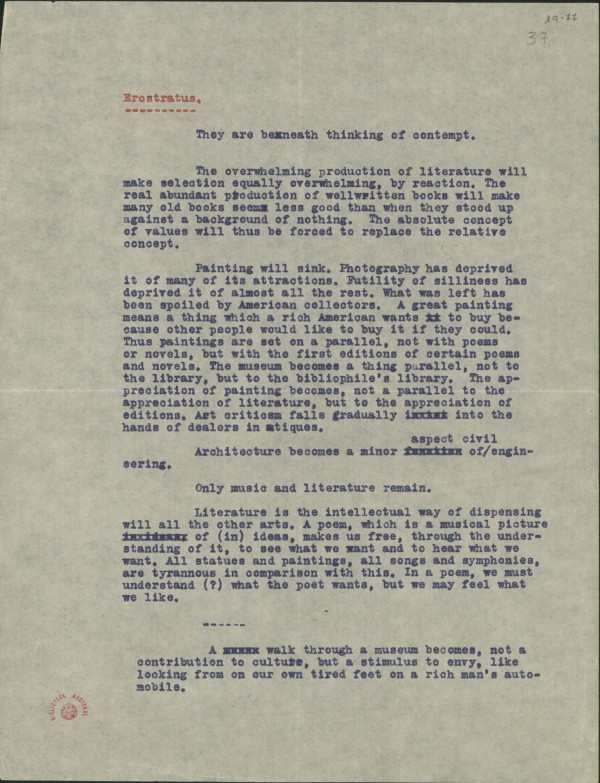Identificação
[19 – 77]
Erostratus.
They are beneath thinking of contempt.
The overwhelming production of literature will make selection equally overwhelming, by reaction. The real abundant production of well-written books will make many old books seem less good than when they stood up against a background of nothing. The absolute concept of values will thus be forced to replace the relative concept.
Painting will sink. Photography has deprived it of many of its attractions. Futility of silliness has deprived it of almost all the rest. What was left has been spoiled by American collectors. A great painting means a thing which a rich American wants to buy because other people would like to buy it if they could. Thus paintings are set on a parallel, not with poems or novels, but with the first editions of certain poems and novels. The museum becomes a thing parallel, not to the library, but to the bibliophile’s library. The appreciation of painting becomes, not a parallel to the appreciation of literature, but to the appreciation of editions. Art criticism falls gradually into the hands of dealers in antiques.
Architecture becomes a minor aspect of civil engineering.
Only music and literature remain.
Literature is the intellectual way of dispensing will all the other arts. A poem, which is a musical picture of[1] ideas, makes us free, through the understanding of it, to see what we want and to hear what we want. All statues and paintings, all songs and symphonies, are tyrannous in comparison with this. In a poem, we must understand (?) what the poet wants, but we may feel what we like.
------
A walk through a museum becomes, not a contribution to culture, but a stimulus to envy, like looking from on our own tired feet on a rich man’s automobile.
[19 – 77]
Heróstrato.
Estão abaixo do pensamento do desprezo.
A esmagadora produção de literatura tornará a selecção igualmente esmagadora, por reacção. A produção realmente abundante de livros bem escritos tornará muitos livros velhos parecerem piores do que quando eram comparados com o pano de fundo do nada. O conceito absoluto de valores será assim forçado a substituir o conceito relativo.
A pintura submergirá. A fotografia privou-a de muitas das suas atracções. A futilidade da imbecilidade privou-a de quase tudo o resto. O que sobrou tem sido pilhado por coleccionadores americanos. Um grande quadro significa algo que um americano rico quer comprar, porque outras pessoas gostariam de comprar se pudessem. Assim, os quadros encontram-se no mesmo patamar, não dos poemas ou dos romances, mas das primeiras edições de certos poemas e romances. O museu torna-se algo paralelo, não a uma biblioteca, mas à biblioteca de um bibliófilo. A apreciação de um quadro torna-se, não paralela à apreciação da literatura, mas à apreciação de edições. A crítica de arte cai gradualmente nas mãos de negociantes de antiguidades.
A arquitectura torna-se um aspecto menor da engenharia civil.
Apenas a música e a literatura permanecem.
A literatura é a forma intelectual de dispensar todas as outras artes. Um poema, que é uma imagem musical das ideias, torna-nos livres, ao compreendê-lo, para ver o que queremos e para ouvir o que queremos. Todas as estátuas e pinturas, todas as canções e sinfonias, são tiranas em comparação com isto. Num poema, devemos compreender (?) o que o poeta quer, mas podemos sentir o que gostamos.
------
Um passeio ao museu torna-se, não uma contribuição para a cultura, mas um estímulo para a inveja, como olhar com os nossos pés cansados para o automóvel de um homem rico.
[1] of /(in)\


